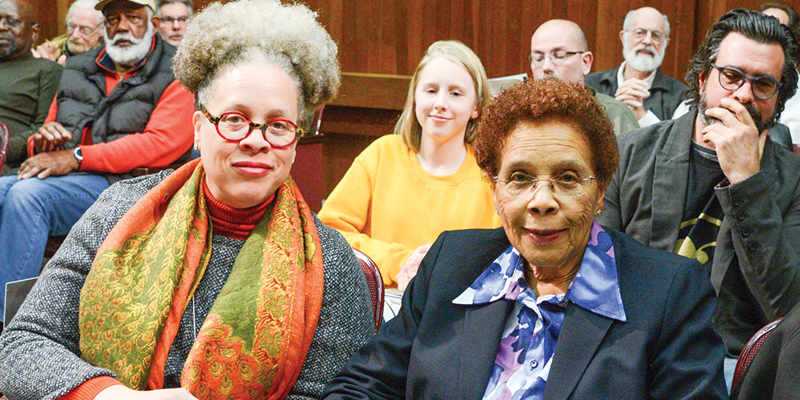It didn’t take long for the new City Council meeting format to break down.
Tuesday, Feb. 6, the City Council held its second town hall-type meeting, and the plan to only hear from the public on the first meeting of every month and conduct business at the second meeting devolved into just another meeting where the rudderless City Council starts going around in circles.
At the first town hall-type meeting in January, Mayor Nancy Vaughan stopped City Councilmember Yvonne Johnson from making a motion to put a resolution on the next agenda because that wasn’t the format of the meeting.
This month Vaughan lost her resolve and numerous confusing, conflicting and overriding motions were made. At one point Vaughan asked everyone to withdraw their motions so the City Council could start over.
This is a City Council that needs an agenda to keep it on track. With no agenda the meeting was impossible, even for members of the City Council, to follow.
At Feb 6’s town hall-style meeting, where the City Council is supposed to listen to the public and not conduct business, it conducted business in a haphazard fashion.
After Lewis Pitts from Democracy Greensboro, an offshoot of the Beloved Community Center, brought up an issue with a police body-worn camera video the City Council had received permission to see but not to make public statements about – the City Council discussed it and took action.
After a long convoluted discussion where motions were made and withdrawn and made again, the City Council voted 8 to 1, with Justin Outling voting no, to watch the video after the Police Community Review Board had completed its review and made a ruling on the incident.
The City Council also voted 9 to 0 to have City Attorney Tom Carruthers petition the court to allow the city councilmembers to talk about the video in public.
At one point Outling said he was changing his vote to a no because he didn’t think the City Council needed to approve the resolution drafted by Carruthers. But Councilmember Michelle Kennedy, who made the motion, agreed with Outling, so maybe after changing to a no he changed it back to a yes, or maybe not. It was a confusing meeting.
It is worth noting that all the police body-worn camera videos that the City Council has viewed have been as a result of requests, or perhaps demands, by Nelson Johnson of the Beloved Community Center and his followers. The City Council has never of its own volition decided to view a police body-worn camera video.
So in essence it is Nelson Johnson who is running this show. He decides what police body-worn camera videos the City Council should view, and then when he demands, either in person or through a proxy, that they do so, the City Council does.
It is the reason that the City Council viewed the video of the arrest of Dejuan Yourse and agreed to pay Yourse $95,000. Yourse has since been sentenced to over 10 years in prison after being convicted of crimes, including two assault charges. In both cases he assaulted a woman.
Outling questioned whether it was the job of the City Council to view police body-worn camera videos since police officers work for the police chief and city manager. Outling noted that the City Council only had two employees, the city manager and the city attorney, and it was the job of the City Council to set policy, not make determinations on the actions of individual city employees.
The City Council also had several discussions about what to do about Café Europa, and when to decide what to do, but in the end it decided to do nothing.
Speakers from the floor included Robert Moore, who is a frequent speaker about a piece of property on Air Harbor Road that he says he never sold, and if it was sold that he was never paid for it. Moors said he had trouble hearing and asked if a city employee could stand next to him and tell him what the city councilmembers were saying.
A city employee did, and having a city employee repeat everything that was said loudly into his ear seemed to work. But the issue was not resolved.
Moore said, “I want my money.” And everyone heard that without it being repeated.
The City Council also passed a resolution honoring the Carolina Peacemaker for its 50th anniversary. Dr. John Kilimanjaro founded the Carolina Peacemaker in 1967 and has been publishing weekly ever since. Dr. Kilimanjaro, the publisher, was not able to attend the meeting but his daughter Afrique Kilimanjaro, the editor, and is wife, Vickie Kilimanjaro, the associate publisher, accepted the resolution on his behalf.
At a work session held in the Plaza Level Conference Room before the regular meeting, the City Council moved one step closer to renaming parts of Westover Terrace and all of Aycock Street for Josephine Boyd, the first black student to attend what was then Greensboro High School and is now Grimsley High School.
Planning Director Sue Schwartz said the Planning Department had completed a survey and the majority of those who would be affected by the name change were in favor of changing the name of the street, from West Wendover Avenue to Florida Street, to Josephine Boyd Street.
The name change will go to the Planning Board in March and come back to the City Council for approval in April. Schwartz said the Planning Department recommended that people be given six months notice before the change takes effect. The cost to the city will be about $15,000.

